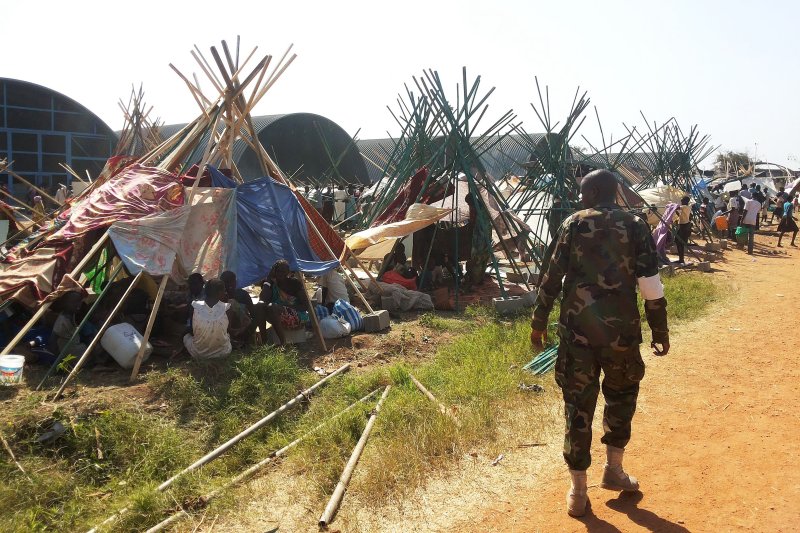Civilians at the UN House compound on the southwestern outskirts of Juba on December 17, 2013. Up to 13,000 South Sudanese civilians have sought refuge at the UN compounds in Juba, fleeing fighting between members of the SPLA (Sudan People’s Liberation Army) that broke out in Juba on the night of 15 December. UPI/UNMISS/Julio Brathwaite
GENEVA, Switzerland, Dec. 24 (UPI) -- The U.N. Security Council voted Tuesday to nearly double the peacekeeping force in South Sudan to nearly 14,000 troops.
The authorization came as three mass graves were discovered in the country and its former vice president said he is organizing a delegation to meet with President Salva Kiir in a bid to end several days of violence that officials said they believe killed at least 1,000 people.
The meeting between Kiir and Riek Machar could take place in Addis Ababa, Ethiopia, Radio France Internationale reported.
Machar's announcement came as U.N. human rights commissioner Navi Pillay called on both sides to protect civilians and stop instigating ethnic violence.
In a statement issued from her office in Geneva, Switzerland,Pillay said evidence had been found of mass killings.
"Mass extrajudicial killings, the targeting of individuals on the basis of their ethnicity and arbitrary detentions have been documented in recent days," she said. "We have discovered a mass grave in Bentiu, in Unity state, and there are reportedly at least two other mass graves in Juba."
More than 40,000 people forced from their homes by the violence had sought refuge in the past several days in compounds housing the U.N. Mission in South Sudan, she said. She called on both sides to end arbitrary detentions and to reveal the locations of those already detained.
Pillay said people of Dinka and Nuer backgrounds had "palpable fear" of being killed. She urged authorities to make "clear statements" that human rights violations would not tolerated.
A contingent of 150 U.S. Marines was moved to a military base in Djibouti in case they are needed to help evacuate Americans and provide security for the U.S. Embassy, military officials said.
A senior administration officials said the United States is trying to determine how many more are still in the country.
"Based on registration, there are American citizens in other towns and areas throughout South Sudan," the official told CNN. "We are trying to track down how many may still be there. Many may have gotten out on their own. We are trying to track that down."
About 380 U.S. citizens and another 300 people from other countries have been evacuated in recent days, U.S. defense officials said.
Secretary-General Ban Ki-moon requested the surge in U.N. peacekeepers, saying the troops would be used to help protect tens of thousands of civilians under siege in the landlocked 2-year-old Middle Africa nation.
The United Nations said in a release the 15-member Security Council unanimously approved temporarily increasing the force in South Sudan to a maximum of 12,500 military and 1,323 police, from a current combined strength of about 7,000. The surge would be accomplished by transferring units from U.N. forces in the Democratic Republic of Congo, Darfur, Abyei, Ivory Coast and Liberia.
The Security Council resolution demanded an immediate end of hostilities and the immediate commencement of talks between the rival factions. The Security Council condemned the fighting, as well as the targeting of civilians and ethnic communities, and attacks and threats against U.N. peacekeepers.
Ban said Kiir and opposition political leaders must "come to the table and find a political way out of this crisis."
"Whatever the differences, nothing can justify the violence that has engulfed their young nation," the U.N. leader said, adding the conflict can't be solved militarily. "Attacks on civilians and the U.N. peacekeepers must cease immediately. The United Nations will investigate reports of these incidents and of grave human rights violations and crimes against humanity. Those responsible will be held personally accountable. They should know the world is watching."
Ban said it will take time to get the additional U.N. forces in place and added "even with additional capabilities, we will not be able to protect every civilian in need in South Sudan."
"This is a political crisis which requires a peaceful, political solution," Ban said. "In this season of peace, I urge the leaders of South Sudan to act for peace.
"Stop the violence. Start the dialogue. Save your proud and newly independent country. There is no time to lose."
The 150 Marines, along with four V-22 Osprey tilt-rotor aircraft and two C-130 Hercules transport planes, are being sent from Spain to the Horn of Africa country of Djibouti, where an emergency force was created after the deadly Sept. 11, 2012, attack on the U.S. diplomatic mission in Benghazi, Libya, the U.S. Africa Command said.
"By positioning these forces forward, we are able to more quickly respond to crisis in the region, if required," an Africa Command statement said.
It cited the Benghazi attack, which killed four people, including U.S. Ambassador Christopher Stevens, and injured 10 others.
"One of the lessons learned from the tragic events in Benghazi was that we needed to be better postured, in order to respond to developing or crisis situations, if needed. These precautionary movements will allow us to do just that," the command statement said.
Washington was considering cutting off U.S. aid to South Sudan, the Wall Street Journal said.















